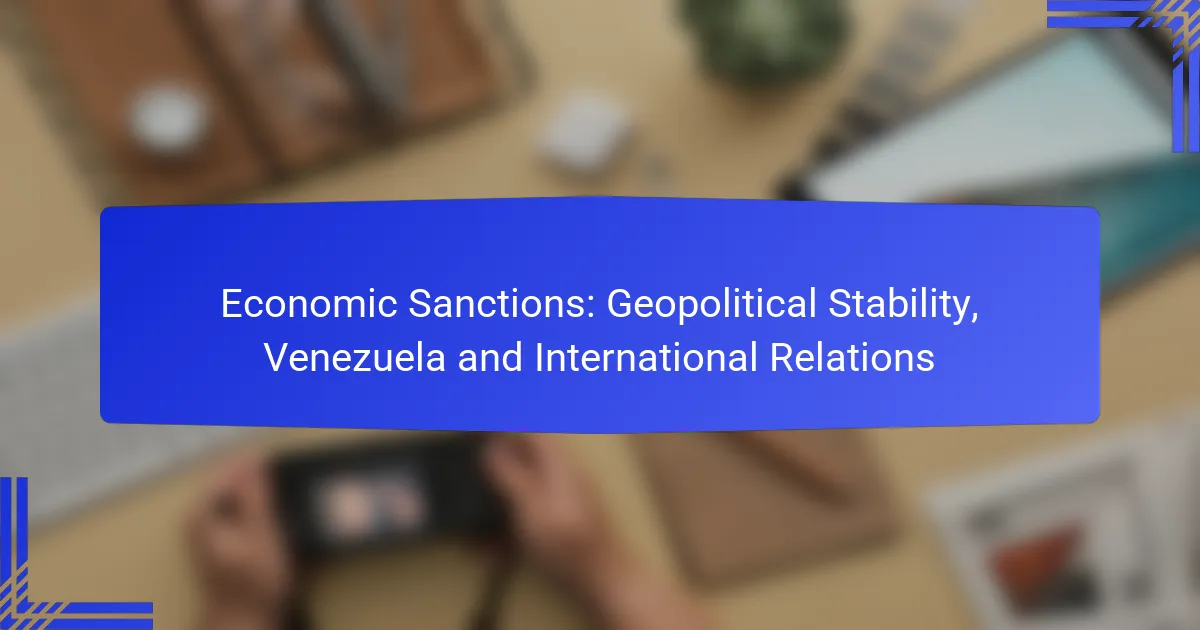Economic sanctions imposed on Venezuela have profound implications for its geopolitical stability, severely limiting access to international markets and resources. Targeting key sectors such as oil and finance, these sanctions aim to pressure the government towards democratic reforms, while simultaneously reshaping international relations and altering market risks.
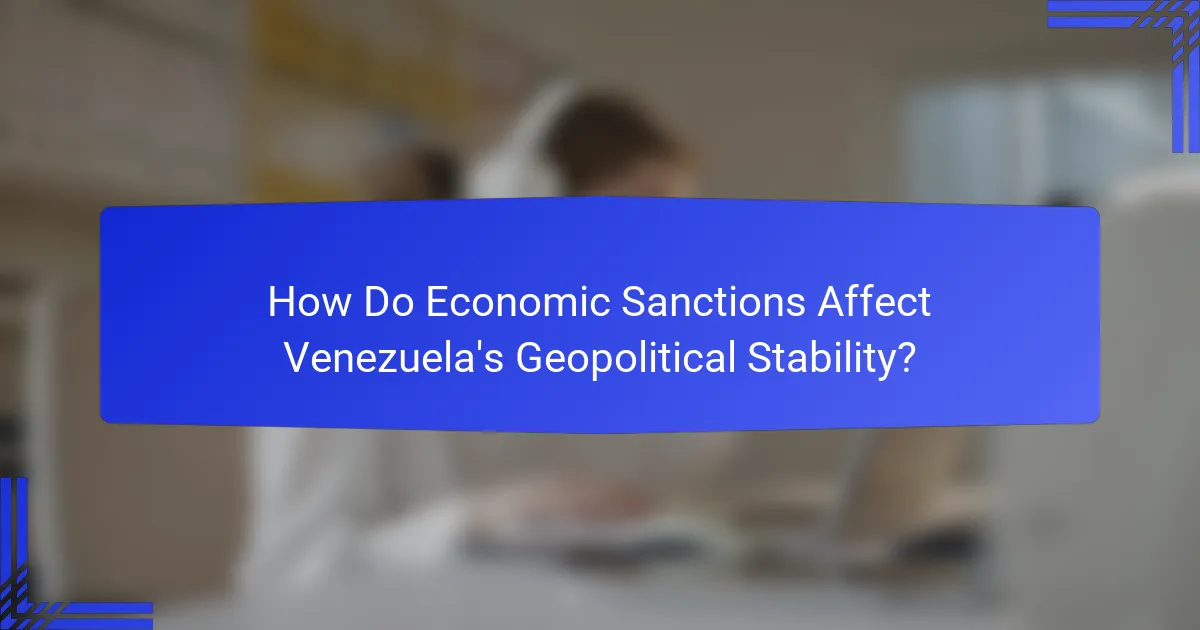
How Do Economic Sanctions Affect Venezuela’s Geopolitical Stability?
Economic sanctions significantly undermine Venezuela’s geopolitical stability by restricting its access to international markets and resources. These sanctions often lead to political isolation, economic decline, and social unrest, which can destabilize the region further.
Impact on political power
Economic sanctions weaken the Venezuelan government’s political power by limiting its financial resources and ability to govern effectively. The ruling party struggles to maintain control as sanctions exacerbate public dissatisfaction and reduce state revenues, leading to potential challenges from opposition groups.
As the government faces increasing pressure, it may resort to authoritarian measures to suppress dissent, further entrenching its power but risking greater instability. This cycle can lead to a volatile political environment, making governance increasingly difficult.
Effect on economic conditions
The imposition of economic sanctions has led to severe economic conditions in Venezuela, characterized by hyperinflation and a significant decline in GDP. Access to essential goods, including food and medicine, has been severely restricted, pushing millions into poverty.
With a shrinking economy, unemployment rates have soared, and many citizens rely on informal markets for basic necessities. The economic crisis creates a feedback loop, where worsening conditions fuel further unrest and dissatisfaction with the government.
Influence on social unrest
Economic sanctions contribute to heightened social unrest in Venezuela as citizens react to deteriorating living conditions. Protests and demonstrations have become more frequent, driven by frustrations over shortages and government inaction.
The lack of basic services and rising discontent can lead to violent clashes between protesters and security forces, further destabilizing the country. This unrest not only affects domestic stability but also poses risks to neighboring countries as refugees and instability spill over borders.
Regional security implications
The geopolitical instability resulting from economic sanctions on Venezuela has significant regional security implications. Neighboring countries may experience an influx of Venezuelan refugees, straining their resources and social systems.
Additionally, the potential for increased criminal activity and the rise of armed groups in Venezuela can pose threats to regional security. Countries in the region may need to enhance their security measures and collaborate on strategies to address the fallout from Venezuela’s instability.
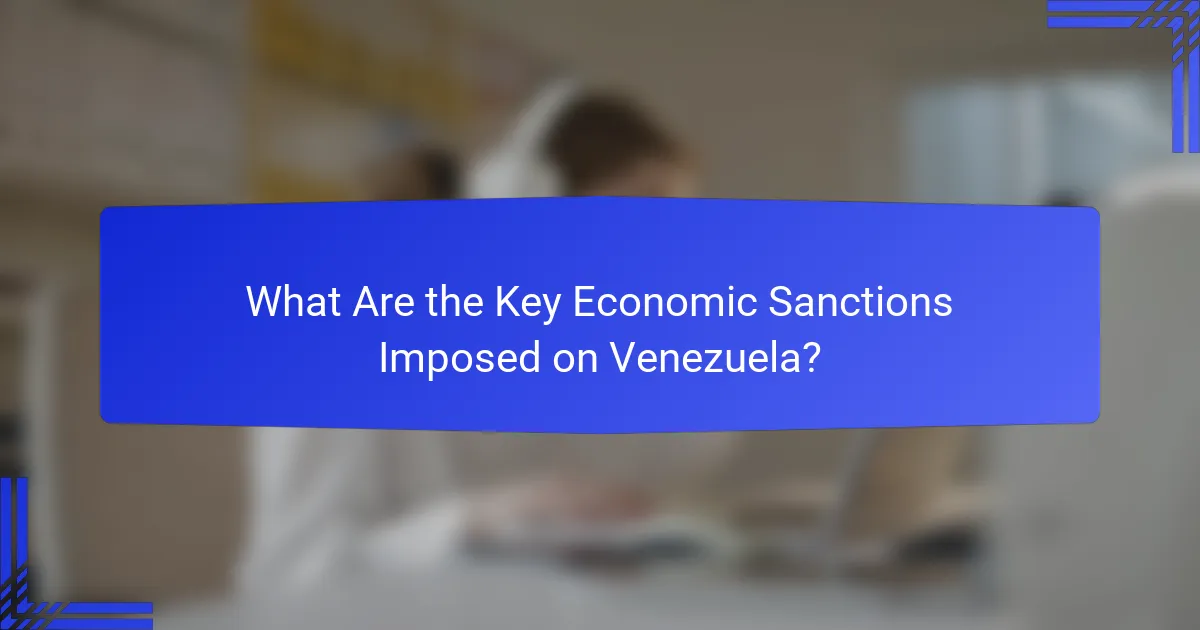
What Are the Key Economic Sanctions Imposed on Venezuela?
The key economic sanctions imposed on Venezuela primarily target its oil industry, financial sector, and government officials. These sanctions aim to pressure the Venezuelan government to restore democratic processes and address human rights violations.
US sanctions overview
The United States has implemented a series of sanctions against Venezuela, focusing on its oil exports, which are crucial for the country’s economy. These sanctions include a ban on the purchase of Venezuelan oil and restrictions on transactions with the state-owned oil company, PDVSA.
Additionally, the US has frozen assets of key Venezuelan officials and imposed travel bans. These measures are intended to limit the government’s access to international financial markets and reduce its revenue from oil sales.
EU sanctions details
The European Union has also enacted sanctions against Venezuela, which include asset freezes and travel bans on individuals associated with the Maduro regime. These sanctions are designed to target those responsible for undermining democracy and violating human rights in Venezuela.
Furthermore, the EU has imposed restrictions on the export of certain goods, including arms and equipment that could be used for internal repression. The EU’s approach emphasizes diplomatic solutions alongside economic pressure.
UN sanctions context
The United Nations has not imposed direct sanctions on Venezuela but has expressed concern over the humanitarian crisis and human rights abuses. The UN encourages member states to consider measures that could alleviate the suffering of the Venezuelan people while holding the government accountable.
In this context, the UN’s role is more about facilitating dialogue and providing humanitarian assistance rather than enforcing economic sanctions. This approach aims to balance the need for accountability with the urgent need for humanitarian support in Venezuela.
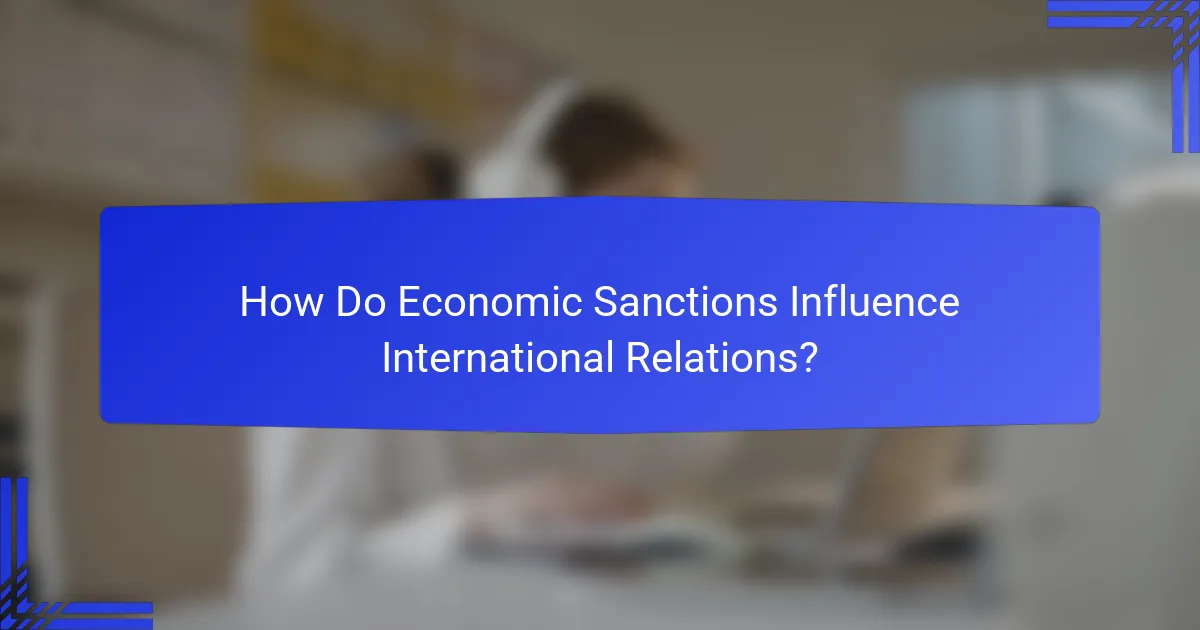
How Do Economic Sanctions Influence International Relations?
Economic sanctions significantly impact international relations by altering diplomatic interactions, trade dynamics, and global alliances. These measures can isolate nations, reshape partnerships, and influence geopolitical stability.
Impact on diplomatic ties
Economic sanctions often strain diplomatic relationships between the sanctioning and targeted countries. For instance, when the United States imposed sanctions on Venezuela, it led to a breakdown in formal communications and reduced opportunities for dialogue.
Countries may also find themselves pressured to choose sides, which can further complicate existing alliances. Nations that continue to engage with sanctioned states may face repercussions, potentially damaging their own diplomatic ties with the sanctioning countries.
Effect on trade agreements
Sanctions can disrupt existing trade agreements and deter new ones. Countries imposing sanctions typically restrict trade in specific goods, which can lead to significant economic losses for the targeted nation.
For example, sanctions against Venezuela have severely limited its oil exports, which are crucial for its economy. This disruption not only affects Venezuela but also impacts countries that rely on its oil, forcing them to seek alternative suppliers.
Influence on global alliances
Economic sanctions can shift global alliances as countries reassess their partnerships based on economic interests and political alignments. Nations may band together against sanctions, forming coalitions to counteract the economic pressure.
For instance, countries like Russia and China have supported Venezuela amid U.S. sanctions, reinforcing their alliance and challenging Western influence. This realignment can lead to a more polarized global landscape, where nations are increasingly divided along economic and political lines.
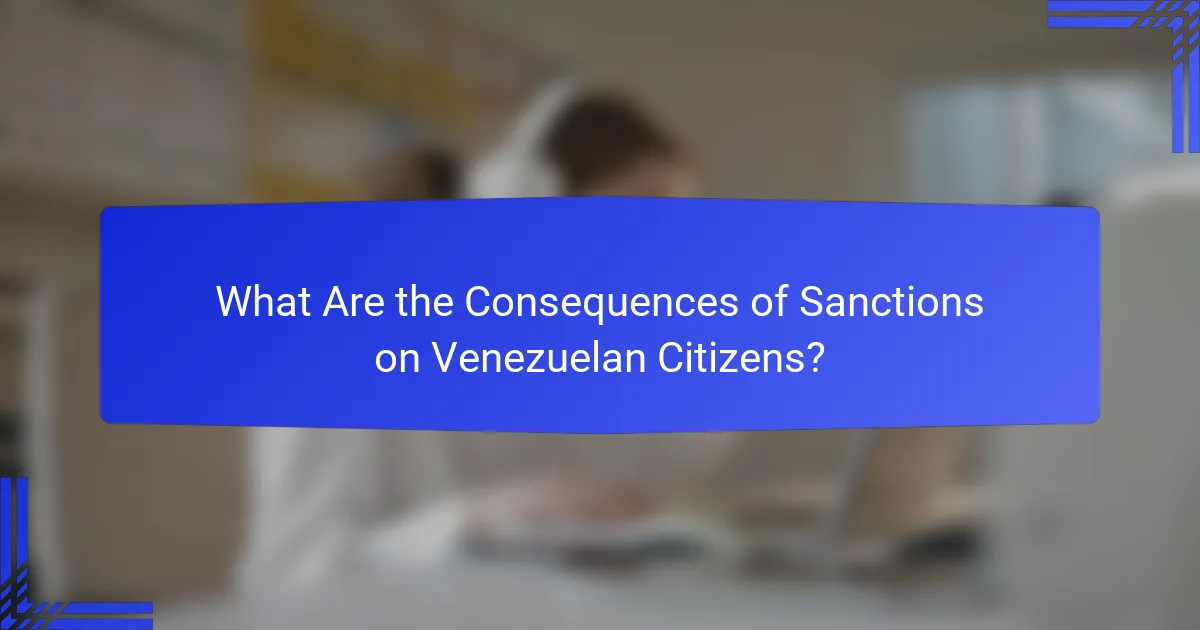
What Are the Consequences of Sanctions on Venezuelan Citizens?
Sanctions imposed on Venezuela have significantly affected the daily lives of its citizens, leading to economic hardship and social instability. These measures have resulted in shortages of essential goods, increased poverty levels, and a deterioration of public services.
Effects on daily life
The daily life of Venezuelan citizens has been severely disrupted due to sanctions. Many families struggle to access basic necessities such as food, clean water, and electricity. Inflation has skyrocketed, making it difficult for individuals to afford even the most essential items.
As a result, the quality of life has diminished, with many citizens resorting to barter systems or relying on remittances from family members abroad. The scarcity of products has led to long queues at stores, where items are often sold at inflated prices.
Impact on healthcare access
Healthcare access in Venezuela has deteriorated significantly due to sanctions. Hospitals face shortages of medical supplies, equipment, and medications, making it challenging for healthcare providers to deliver adequate care. Many patients are unable to receive necessary treatments, leading to worsening health conditions.
Additionally, healthcare professionals are leaving the country in search of better opportunities, further straining the already limited healthcare system. The lack of resources has resulted in increased mortality rates for preventable diseases.
Influence on migration patterns
Sanctions have influenced migration patterns, prompting many Venezuelans to leave their homeland in search of better living conditions. The economic crisis, exacerbated by sanctions, has led to a mass exodus, with millions fleeing to neighboring countries or further abroad.
This migration trend has created challenges for both the migrants and the host countries, as they grapple with integration and resource allocation. Many Venezuelans face difficulties in obtaining legal status and employment in their new locations, adding to their struggles.

What Strategies Can Be Implemented to Mitigate Sanction Effects?
To mitigate the effects of economic sanctions, countries like Venezuela can adopt strategies such as economic diversification, strengthening domestic industries, and enhancing international partnerships. These approaches aim to reduce dependency on vulnerable sectors and create resilience against external pressures.
Economic diversification
Economic diversification involves expanding a country’s economic activities beyond a limited range of sectors, which is crucial for mitigating the impact of sanctions. For Venezuela, this could mean moving away from an over-reliance on oil exports and investing in agriculture, tourism, and technology.
Key steps include identifying alternative industries that can thrive under current conditions and investing in infrastructure and education to support these sectors. For instance, promoting local agriculture can reduce food imports and enhance food security, while developing tourism can attract foreign currency.
Common pitfalls include neglecting the necessary investment in workforce training and infrastructure, which can hinder the growth of new industries. Countries should prioritize creating a favorable business environment to encourage private sector participation and foreign investment.
